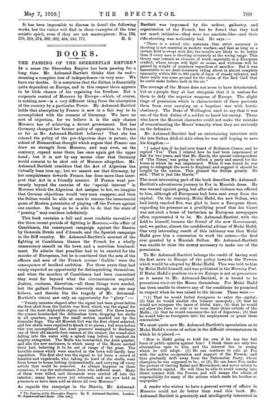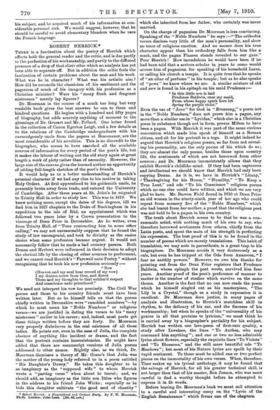BOOKS.
THE PASSING- OF THE SHEREEFIAN EMPIRE.* Ix a sense the Shereefian Empire has been passing for a long- time. Mr. Ashmead-Bartlett thinks that its end—
meaning a complete loss of independence—is very near. We have our doubts. It is notorious that the Sultan is financially quite-dependent on Europe, and in this respect there appears to be little chance of his regaining his freedom. But a corporate control of Morocco by Europe—which, of course, is nothing new—is a very different thing from the absorption of the country by a particular Power. Mr. Ashmead-Bartlett holds that absorption by France is now in a fair way to be accomplished with the consent of Germany. We have no sort of objection, for we believe it is the only chance Morocco has of achieving a decent government. But has Germany changed her former policy of opposition to France so far as Mr. Ashmead-Bartlett believes ? That she has relaxed the policy of the pre-Algeciras days is patent; the school of Bismarckian thought which argues that France can draw no strength from Morocco, and may even, on the contrary, expend some there, has once again got the upper hand ; but it is not by any means clear that Germany would consent to be shut out of Morocco altogether. Mr. Ashmead-Bartlett considers that the Act of Algeciras has virtually been torn up ; but we cannot see that Germany, by her complaisance towards France, has done more than inter- pret that Act in a friendly manner. If France went per- versely beyond the exercise of the "special interest" in Morocco which the Algeciras Act assigns to her, we imagine that German objections would very soon reappear, and then the Sultan would be able at once to resume the immemorial game of Moslem potentates of playing off the Powers against
one another. So long as he is able to do that the state of " passing " may continue indefinitely.
This book contains a full and most readable narrative of the three recent periods of fighting in Morocco,—the affair of Casablanca, the consequent campaign against the Shawia by Generals Drude and d'Amade, and the Spanish campaign
in the Riff country. Mr. Ashmead-Bartlett's account of the fighting at Casablanca blames the French for a wholly unnecessary assault on the town and a merciless bombard- ment. He admits that penalties had to be exacted for the murder of Europeans, but he is convinced that the acts of the
officers and men of the French cruiser ' were the consequence of baulked ambition. For three years they had vainly expected an opportunity for distinguishing themselves, and when the murders of Casablanca had been committed they went far beyond what the circumstances required. Justice, coolness, discretion,—all these things were needed, but the gallant Frenchmen (sincerely enough, as one may believe, and therein lies the tragedy of Mr. .Ashmead- Bartlett's vision) saw only an opportunity for " glory " :-
"Twenty minutes elapsed after the signal had been given before the first shell from the Gali.1,4e was fired, which was the signal for one of the most deplorable orgies ever enacted. For three hours the cruiser bombarded the defenceless town, dropping her shells in all quarters, except the small section marked out by the Consular flags. The old Moorish fort was the first object selected, and few shells were required to knock it to pieces ; but even before this was accomplished the Arab gunners managed to discharge one of their old smooth-bore cannon at the cruiser, the round-shot falling into the water with a splash long before it reached its mighty antagonist. The Mena was bombarded, the Arab quarter, and also the new enclosure, to which many of the Moors carried their loot, believing it to be out of range of the grins. The horrible scenes which were enacted in the town will hardly bear repetition. The first shot was the signal to let loose a crowd of fanatics and vagabonds, who, taking no heed of the shells, went from house to house looting systematically, and carrying off every article that could be removed. As always happens on these occasions, it was the unfortunate Jews who suffered most. Many of them were killed, and thousands were carried off into the interior; many have never yet returned, and are now held as prisoners or have been sold as slaves all over Morocco."
As regards the campaign in the Shawia, Mr. Ash mead-
The Passing of the Sliereefian Empire. By E. ilehmemi-Bartlett. London: W, Blackwood and Sons. 1.15a. net.]
Bartlett was impressed by the ardour, gallantry, and organisation of the French, but he found that they had not much initiative—they were too machine-like—and their rifle-shooting was noticeably bad. He says :—
" There is a school who nutintain that strict accuracy in shooting is not essential in modern warfare, and that as long as a certain field is swept with fire, the results are likely to be better than if every man is shooting accurately at the wrong range. This, theory may contain an element of truth, especially in a European conflict, where troops will fight en MUM, and victories will be gained by weight of numbers regardless of sacrifice. But it was lamentable to see Arab horsemen riding about in almost complete immunity within 600 to 800 yards of lines of steady infantry, and there really was some ground for the claim of the Red Caid that he could make bullets melt in the air."
The courage of the Moors does not seem to have deteriorated, but as a people they at last rdcognise that it is useless for them to defy the superior weapons of Europe. The slight tinge of pessimism which is characteristic of them prevents
them from ever carrying on a hopeless war with heroic obstinacy. The Duke of Wellington used to say that it was one of the first duties of a soldier to know his enemy. Those who know the Moorish character could not make the mistake of overestimating the Moore' tenacity when they are seriously on the defensive.
Mr. Ashmead-Bartlett had an entertaining interview with the late Sultan Abd-ul-Aziz when be was still hoping to save his kingdom :-
" I asked him if he had ever heard of Robinson Crusoe, and he replied 'Yes.' Then I related how he had been imprisoned at San for two years, and that Mr. Harris, the special correspondent of ' The Times,' was going to collect a party and search for the house in which he was imprisoned. When it was found he was going to telegraph the news to England, and suggest it should be bought by the nation. This pleased the Sultan greatly. He' said, ' That is just like Harris.'
The most interesting part of the book describes Mr. Ashmead- Bartlett's adventurous journey to Fez in Moorish dress. He was warned against going, but after all no violence was offered to him, although all Europeans had been sent away from the capital. On the contrary, Mulai Hafid, the new Sultan, who had lately reached Fez, was glad to have a European there, regarding his presence as a gratifying proof that his Court was not such a home of barbarism as European newspapers often represented it to be. Mr. Ashmead-Bartlett, with the field to himself, became the friend of the new Government, and, we gather, almost the confidential adviser of Mulai Hafid,
One very interesting result of this intimacy was that Mulai' Hafid gave him a concession to work the mines,—the first ever granted by a Moorish Sultan. Mr. Ashmead-Bartlett was unable to raise the money necessary to make use of the permission.
To Mr. Ashmead-Bartlett belongs the credit of having sent the first news to Europe of the policy towards the Powers which would be adopted by Mulai Hafid. This was told to him by Mulai Hafid himself, and was published in the Morning Post. If Mulai Hafid's position vis-a-vis Europe is not so precarious as it seems to Mr. Ashmead-Bartlett, it is bound to be precarious vis-a-vis the Moors themselves. For Mulai Hafid has been unable to observe any of the conditions he promised to respect when he was raised to the throne. These were :- " (1) That he would forbid foreigners to enter the capital ; (2) that he would abolish the tobacco monopoly ; (3) that he would not reimpose the taxes of Abdul Asia ; (4) that he would not allow the Jews to ride or to wear their shoes outside of the Melia; (5) that he would renounce the Act of Algeciras; (6) that he would take no foreigners into his employment or grant them concessions."
We must quote now Mr. Ashmead-Bartlett's speculation as to Mulai Hafid's course of action in the difficult circumstances in which he is placed:- " How is Hafid going to hold his own if he has the full force of public opinion against him? I think there are only two alternatives open to him, and the interest lies in seeing which he will adopt: (1) He can continue to rule at Fez with the active co-operation and support of the French, and thus gradually drift away from the Nationalist Party, whose champion he was supposed to be ; or (2), He can leave Fez, under the pretext of visiting Rabat and Marrackeeb, and never return to the northern capital. He will thus be able to avoid coming into direct contact with the Powers, and will escape the odiuin of responsibility for many of the actions which made his brother so unpopular."
A reader who wishes to have a general survey of affairs in Morocco could not do better than read this book. Mr.
Aehmead-Bartlett is genuinely and intelligently interested in his subject, and he acquired much of his information at con- siderable personal risk. We would suggest, however, that he should be careful to avoid elementary blunders when he uses the French language.











































 Previous page
Previous page